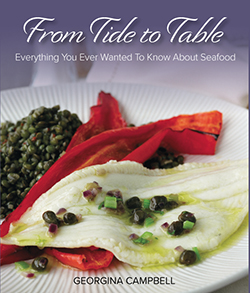7 things every foodie should know about the TTIP treaty and the secret seven who got exemptions
 Seanad Candidate Ross Golden-Bannon explores the all-encompassing CETA & TTIP treaties and their many worrying provisions, which bode ill for the Irish food sector.
Seanad Candidate Ross Golden-Bannon explores the all-encompassing CETA & TTIP treaties and their many worrying provisions, which bode ill for the Irish food sector.
International trade seems like a very distant affair to those of us who care about our immediate foodie neighbours. But if the closest thing you’ve got to trade is swapping your windfall apples for some elderflower syrup, now is the time to get worried. Two mega-treaties, which the EU is about to sign with the US and Canada, could see all we hold dear in the food world come to nought.
TTIP, the Trans-Atlantic Trade & Investment Partnership, and CETA, its Canadian cousin are the largest global treaties ever. TTIP, pronounced ‘tea-tip’, encompasses just about every area of human endeavour from health services to education, from food to manufactures, from medical supplies to employment practices.
In fact, in a breath-taking departure from even the most basic human norms the treaties cover everything unless stated as being excluded in the treaties. Ireland has negotiated just seven exclusions but there’s plenty in the treaty to be worried about too.
1 Standards will be equalised between the EU and the USA.
European standards are based on a ‘precautionary principle’, this means producers must prove chemical or other ingredients are safe before they can be used.
In the US the opposite is the case where just 16 chemicals are banned in cosmetics yet the EU considers some 1,200 chemicals too dangerous for human use.The Commission claims “EU standards simply aren’t up for negotiation. TTIP would uphold them.”
Yet EU TTIP negotiators caved in under pressure from the American Chamber of Commerce deciding not to ban 31 pesticides containing endocrine disrupting chemicals linked to cancer and male infertility. Can we really trust what the Commission says?
2 GMOs.
While some argue that GMOs are not harmful others hold the opposing view. Either way the use of GMOs are a symptom of mono-cultural farming as the mega farms eschew sustainability for mass production and high profit margins. At present in the US over 90% of corn, soya and cotton is genetically engineered. In the EU we grow almost no GMO crops and individual states can ban GMOs.
3 Pesticides.
Over 80 pesticides used in the US are banned in Europe and we tolerate lower levels of pesticide residue than the US. It’s highly unlikely that the US will raise their standards to match ours as it would require a major cultural and structural change. In Europe firms must prove a material or substance is safe before they can us them while in the US the opposite is the case as any substance can be used until it’s proven to be unsafe.
4 Hormones.
The use of growth-promoting hormones are banned in cattle or pigs across the EU because of links to a wide range of illnesses and the particular risk to children’s health. In the US they have no such qualms and hormone use is normal practice. As we stand now hormone treated US beef sales are banned in the EU. However, negotiators and lobbyists including the American Farm Bureau Federation said: “continuing barriers to the export of U.S. beef... are major areas of interest.” The EU is also proposing to dilute meat and food import inspections and plans to accept lower international standards. This will completely undermine our national beef industry.
5 Chemical washes on chicken.
As the US have an ‘end of pipe’ form of food chain management they have much lower concerns about farm hygiene. Essentially inadequate hygiene on farms and in abattoirs means disinfectant washes are used at the end of process to kill the higher levels of bacteria. Chemical washes are banned in the EU as a ‘farm to fork’ approach creates higher levels of hygiene along the entire production process. These higher EU standards are viewed as ‘barriers to trade’ by US negotiators.
6 Absolutely everything is in the treaty unless otherwise stated.
In an extraordinarily Machiavellian masterstroke these treaties do not state what goods and services they include, everything is assumed to be in the treaty unless you state otherwise through a list of exemptions.
Our government has only managed to protect a handful of our economic activities. Such areas of business include Irish mining and ore extraction companies; legal services in respect to Irish law and EU law (but significantly not international law); social services, (but excluding convalescent and retirement homes); along with a range of marine related activity including fishing, aquaculture; seagoing transport; as well as construction of waterways, harbours, dams and other water works.
Food and farming, except aquaculture, does not appear on the list so these sectors will be open to competition from mega-farms and trans-national food manufacturers, driving prices and standards down. But that’s not the end of it.
7 New international courts which bypass national law.
A mechanism has been created to allow companies to sue states if they believe policy changes damage their profits or future earnings. This means any laws created to protect health or the environment can trigger lawsuits, which bypass our courts. It will strengthen the hand of companies like the Japanese Tobacco company who have threatened to sue us over our plain packaging cigarettes.
The number of these investor-state cases has ballooned over the last two decades from just three in 1995 to some 700 by January 2016 and a record of 70 in 2015. The amount of compensation has also expanded dramatically, with an award against Russia at a stratospheric US$50 billion (Yukon Oil v Russia).
Some 60% of the trade claims against EU member states concerned the environment. Fears over these legal actions will also having a chilling effect on all sorts of protective legislation from bans on toxic chemicals, anti-discrimination policies, financial stability measures, the environment and protecting the integrity of our food.
While I don’t object to a bit of trade, where else would I get some limes for my gin and tonic, mega-treaties such as TTIP & CETA are a very long way from fair trade principles. There is no evidence that jobs will be created and every evidence to the contrary. The NAFTA trade agreement between the US, Canada and Mexico saw a loss of one million US jobs over a 12 year period rather than the much promised hundreds of thousands of extra jobs.
The Commission ‘independent impact studies’ are in fact their own studies which claim there will be annual GDP growth of 0.05%. In fact this growth is over a 10 year period. More realistic predictions suggest little more than 0.01% growth over ten years. A trivial figure which the Trade Commissioner, Cecilia Malmström would prefer us not to know.
But here’s what she does know and think about the millions of people across Europe protesting against TTIP: “I do not take my mandate from the European people.” It’s time we let her know otherwise.
Ross Golden-Bannon is a member of the Irish Food Writers’ Guild and is standing as an Independent candidate for Seanad Éireann for the NUI Panel. Follow him on Twitter at @goldenshots.






There are currently no comments
Leave a comment
Not a member? Register for your free membership now!
Or leave a comment by logging in with: